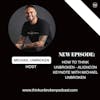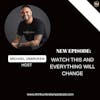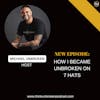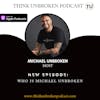E337: Why Your STORY MATTERS with Seth Erickson | CPTSD and Trauma Healing Coach
I'm very excited to share today's episode with my guest, Seth Erickson, a branding expert. I wanted to have Seth on, even though the show isn't necessarily entrepreneurial; as you guys have heard me say before, I always feel like this sense of freedom...
See show notes at: https://www.thinkunbrokenpodcast.com/e337-why-your-story-matters-with-seth-erickson-cptsd-and-trauma-healing-coach/#show-notes
I'm very excited to share today's episode with my guest, Seth Erickson, a branding expert. I wanted to have Seth on, even though the show isn't necessarily entrepreneurial; as you guys have heard me say before, I always feel like this sense of freedom that comes with entrepreneurship and living your dreams really starts with your voice, your mission, your message, and this back and forth.
Seth and I talk about the importance of the willingness to honor your voice, to hold your truth, and to put yourself out there even, especially when life is scary as it can sometimes be. And in my journey, I've found that the more I was willing to put myself out there, the more I was willing to face the possible criticism of the world, regardless of what they believe versus what I believe, the more sure-footed I've become in this experience.
I hope that you'll take from this episode maybe a little hope or even a planting of a seed of an idea that your mission and your story truly do matter. And that storytelling is a beautiful way to convey that to the world!
Learn more about Seth Erickson at: https://www.storifyagency.com
You can download the first chapter of the book, which actually talks about the neuroscience stuff: https://www.storifyagency.com/unbroken
Learn more about Think Unbroken and Pre-Order my new book: Unbroken Man. Plus, learn more about the free coaching and other mental health programs. Click here: https://linktr.ee/michaelunbroken
Support the Podcast: Become a listed sponsor!
Follow me on Instagram @MichaelUnbroken
Learn more about coaching at https://coaching.thinkunbroken.com
Get your FREE copy of my #1 Best-Selling Book Think Unbroken: https://book.thinkunbroken.com/
Michael: Hey, what's up! Unbroken Nation! Hope that you're doing well, wherever you are in the world today. I am very excited to be back with you with another episode and my guest, Seth Erickson, who is a bestselling author and founder of the Storify Agency. Seth, my man, what is going on in your world today?
Seth: Oh, today, well, it's the weekend, so, I've taken it easy, and doing podcasts.
Michael: I love it, man. I always tell people like, if you wanna go for your dreams, sometimes you're gonna have to work on Saturday, you know? So, I'm very excited to be here with you and thank you so much for showing up and being present with me today. For those who don't know, can you tell us a little bit about your backstory and how you got to where you are today?
Seth: Yeah, so, I guess the best place to start would be 2015. I ran a successful web design agency and I was becoming completely dissatisfied in what I was doing with my agency, because we were winning awards, getting paid really well, had really happy clients.
And every time I asked the clients you know, are we helping grow your business? And they'd be like, well, what do you mean? I'm like, well, are you getting more sales? Are you getting more contacts? Are you we pushing the needle in any way, shape or form? And the answer was always, no, and I'm like, uh, okay, and they were like, but we're really happy with the work I'm like, okay. But like, you go to design school and they talk about, you know, designs gonna change the world and I'm like, all right, I wanna change things, I wanna help people like I'm in business to help other people, you know, have a better life or do something more.
And that was kind of always my focus. So, I got really dissatisfied because I'm like, okay, we're doing all this stuff, but what's the point, right? Like, you're just kind of like in this place where you're like, my job doesn't have any meaning. Yes. I'm making all this money, but there's no meaning to what I'm doing.
So, I called a friend of mine, uh, who was the used to be the international head of branding for GoDaddy. And I said, hey, I'm thinking about need to make a change in the business, and I don't know what to do next. And so, went through a process that he had for like branding and stuff. And he said, okay, you're a storyteller and I was like, great. How do you make money as a storyteller? like, I thought. Storytellers are people who work in Hollywood who write movies or they write books or poems or music or whatever. And I just didn't see myself as any of those types of people. And he said, well, I've got this book called story wars by Jonah Sachs, and he said, you should check it out. He's like this guy runs an agency, he's a storyteller, maybe you can learn something. And so, I read the book and it was basically like, I was struck by lightning. I was like, oh, my gosh, this makes so much sense, I need to learn more about this. And so, I read that book and then, um, I read a bunch of books, the hero's journey by Joseph Smith, story by Robert McKee, Lisa Kron has like three or four books on storytelling. And so, I read all those and continued to read books, um, and basically in a year or so I read about 50 books and then through those books, I started learning all this neuroscience stuff that was happening and all the research that was going into it.
So, then I read several hundred research papers and don't do that to yourself, that's all I can say. Don't read research papers about storytelling. There was all this really fascinating neuroscience stuff that they were now starting to, or have begun to understand over the last 20 years. Right? Because now we're able to scan brains and look at things and so I said, okay, so there's something more with story that's happening and basically, I was like, after I read all the books on storytelling, I was like, this is amazing. I wanna do this. And then after I read the science, I was like, oh, this is like legitimate. So, what do we do? And so, we actually started applying, you know, some of the things that we were learning from these different books and how to craft a story and applying to email campaigns and applying to websites and things like that. And we started actually seeing the needle move in people's businesses. We started seeing double the open rates. We started seeing three and four and five times the industry standard for click through rates and things like that, and we went, holy crap, this stuff works. So, we basically changed from a generic web design agency, you know, with all the classic tropes of we're so cutting edge, we're so creative and all this stuff too. You know, we're storytelling and branding agency and so we changed the name, storify agency. The reason we call it storify is not because we're trying to be cool, like Shopify or, or Spotify, but storify actually is a word that means to tell or narrate in story. So, we made that shift and then we did that, of course, right? At the beginning of the pandemic, which is always a good time to restart your business and that's where we are now.
Michael: Yeah. And I relate to that in a lot of ways, because I think that even with Think Unbroken in this podcast and writing and narrative storytelling, like, it matters. And one of the big reasons I wanted to bring you on Seth is so we could dive into that because I think people maybe misattribute a lot of the information that they take in as story. And they just look at it as, oh, this is this thing in front of me right now, but there there's depths to it, there's scope to it. And one of the things that's been sitting with me a lot, especially recently is man, I've almost entirely removed myself from media because about three months ago, it hit me so strongly like, oh, we live in the most fear based society, probably in history. And I think that it's impacting people in this dramatically negative way that it's almost crippling and I found myself caught in the algorithm, even though I've been in as many people know background of international marketing and advertising for majority of my adult life. I even got caught up in the throes of it and I said, wait a second, there's actually something here. And what I think is really interesting about knowing what you do is you talk about why the brain is actually like a computer more so than we realize, and you have the ability to hack humans. I think that's really important and I would love for you to dive in and talk about what that means.
Seth: Yeah. So, for the book I used the computer analogy mainly because the book is targeted at startups although anybody who's an entrepreneur or a small business owner, can pick the book up and, and really understand the principles and start applying them in their business. But essentially, so, to break it down, kind of in some simplistic way. We have a conscious and a subconscious that's kind of like your windows and your dos or your Mac and your Lunix. We have short term and long-term memory, that's like RAM and a hard drive. We have a biases, which are basically, the firewall that essentially, allows what's gonna come in and what's gonna come out and kind of how we're gonna see the world.
And so, from there it was like, okay, well, what are the applications that run on the operating system? Well, there's stories. Every experience we have, we tell in a story, or we remember in a story format. And so then the next question becomes, well, how do you, so it's a little bit hyperbolic, I guess, to say, you know, hacking humans, but you gotta market when you got a new book. But the idea though, is still true that basically to write to the operating system you use storytelling. And so, that is what the brain, it's a pattern, basically, when you tell the hero's journey or a type of hero's journey, it's a pattern that the brain understands, it picks up on and it locks into.
And so, that's how, you know, people, can sit and through a two-hour movie and walk out and they're like, wow, that was really short or if they didn't like the movie, they'd be like, that was terrible. I can't believe I wasted two hours of my life. But point being is like, people can sit there and be completely focused on something for two hours to the point that like, they don't even realize time is passed by. Right? And it's because the brain is so locked into that, that narrative. So, that's kind of the gist of you know, why the brain is like a computer.
Michael: And when people are walked into that, I mean, I would have to assume that there are both positive and negative connotations that go along with consumption. Right? And what I'm wondering here is how can in understanding that we can be so biased because of really, it's almost force fed to us in the way that we look outwardly at things. How can you better understand, like in real time, what narrative is being spun to you and how to kind of make meaning of that?
Seth: Okay. So, it's a little bit more difficult question to answer. Mainly because so for the book, I started going down like the psychology route of storytelling, and there's a huge area there, and I was pretty much like, uh, I'm never gonna get this book done if I try to go down this and understand everything that's going on here. To your point though, about bias, uh, bias is a double-edged sword, it's not necessarily a bad thing and it's not necessarily a good thing. What I mean by that is, you wake up every morning, you know, assuming that when you touch the ground, you're gonna be able to stand on it. Right? That is basically a bias. And so, we have biases to they basically act as shortcut keys, if you will. So, we don't have to think about every little thing we're doing, right?
So, I don't have to get outta bed, wonder if the floor is gonna be there or not. Right? I just make that assumption and that becomes part of the bias towards, you know, matter basically. So, in the narratives and different things that are happening, you know, we definitely are being influenced in one of the things I talked to somebody about this a while ago. I said, you know, everything that's going on around us, uh, whether it's politics or the news or any of these things that are going on, it's basically a narrative war. We don't understand that we're in this narrative war. Um, like if you look at politicians, you know, one side says this thing, the other side says this thing, and they're both trying to get their story, get you to believe their story or their version of the story. Right? And so, there's this conflict going on and yeah, I mean, it's basically, um, manipulation, it's propaganda essentially the dark side of story, which in my book, I specifically didn't cover because I was like, I don't want to go down this route and be like, the guy who's like, okay, children, here's how you build a bomb. You know, like, so, I specifically left that kind of stuff out, but you are correct in sort of identifying that, like we are constantly being bombarded by these things and they do affect us over time.
Like, you know, you may not realize it right away. But over time, you know, it's a little bit of codes can seep in, a little more seep in, a little more sees in, and then, like you said, one day you wake up and you're like, holy crap. I'm afraid of everything or I'm still so stuck in fear.
You know, a perfect example of this is, well, if you talk to anybody who watches way too much CNN, or way too much Fox, they're always angry, right? Why are they angry? Because they're being fed a diet of anger and negativity and all this stuff. And it's like, um, so it's hard to have conversations with people when they're in that mindset, when they're stuck in that place and it's hard to draw them out of that place and say, you know what, like everybody, we're all people, right? Like it doesn't have to be us versus them on every little thing. But that is an aspect that, yeah, I specifically was like, no, let's not go down, go down this route.
Michael: Yeah. And what's so fascinating to me, it almost feels like, and look as someone who's been in marketing for very long portion of their life, like I recognize how stories spins narratives that people consume to help purchase products or to listen to a podcast or to really, it's everything is marketing, like I really think about that in my day to day. Like everything from building relationships, with people to having this conversation right now in real time, like everything is marketing, cuz you're always positioning yourself to an extent into the world. And what I think people get lost on quite often is not recognizing like, I mean, I hate to say this, but it's true, there is always a level of manipulation happening in your life. And I think from what you're talking about it and recognizing the neuroscience of it. I would love for you to talk about the neuroscience and storytelling and how those two things parlay?
Seth: Yeah. So, you said something important there, which is you brought up emotion, right? So, from a neuroscience perspective emotion, does several different things. One, it moves, it moves a memory from short term to long term. Right? So, when you have an emotion, that memory, doesn't just get cleared out by RAM like it's, you know, there's lots of things that happen throughout the day and you don't remember them, like, you know, you might have gotten up and I don't know. You know, got some coffee or whatever and then, you know, you do that every day and you don't necessarily remember, oh, you know, what was I doing at that moment? So, your brain kind of goes through and removes those things. But when emotion is injected into the situation, like, let's say for instance, you go to the store, and you know, you do that all the time, that's normal activity, but then you go to the store and you get hit by a car. Well, getting hit by the car, at the store is going to go, that's gonna be an emotion, that's gonna move into your long-term memory. So, one of the other things that we've learned, or that the neuroscience tells us is that people don't buy on logic, they buy on emotion and then they use their logic to justify the action that they took. So, if you are, you know, watching a commercial or you see a thing and you're excited about that thing, or it pulls on your heartstrings or whatever it is, whatever emotion, you may want to want to buy it and then you'll justify why you bought that thing.
The other interesting point is that, and this kind of goes back to what we were talking about like with all these narratives going on. Emotion kicks people into action. So, if they don't have emotion, they about a certain thing. Like let's say it's a political topic. If they don't get emotionally involved in that idea or that topic, then they won't take any action.
So, what you see is a lot of people trying to manipulate other people's emotions to get them to take action, because we know from a science standpoint, that's what causes us to take action. So, it's another tool that is basically used. And so in, I guess, going back to your question earlier, you know, how can we realize when we're being manipulated?
Well, you almost have to stop and say, I'm feeling this thing. Why am I feeling this thing? And is that a good thing? Or is that a bad thing? Right? Like, am I being pulled into this thing or is this something I agree with? So, I don't know. I kind of, I'm jumping all over the place, but I'm trying to answer your question.
So, continuing on the neuroscience topic, several different things that I highlighted in the book, the first chapter of the book is actually about the neuroscience and there's actually a bunch more stuff, but I just didn't. I was like, this is gonna get way too nerdy and I'm just gonna turn people off, so I kind of tried to pick, I cherry pick some of the most interesting tidbits. So one is, they didn't experiment where they hooked up a storyteller's brain, and scanned his brainwaves and then they hooked several hundred people in an audience, all to these same machines. And what they noticed is that when the storytellers started telling the story, over time, everybody in the audience, their brain synced up with the storyteller's brainwave. So, that's some like really science fictiony kind of stuff. Right? Like we never knew that was going on. When people were telling stories, we just knew people like stories and they listened to stories, but we didn't know that like we're actually, at a brainwave level getting on the same frequency if you will.
So that was an interesting tidbit. And I think that speaks to, how you can connect with people on a deeper level when you're using storytelling versus like shouting at them and trying to get their attention, which is what a lot of marketing tends to do.
One of the other things that we started to learn is that when people tell us a story, then we in return start creating a simulation of that story in our heads. And so, what we're basically doing is the brain's going okay, what would I do in this situation? How do I survive? How do I, you know, whatever, like, I'm sure you've probably watched a movie, and thought, you know, well, if I was in that situation, right, like if I was John McClain and Nakatomi tower, I would've done this or that, or maybe I wouldn't have done anything, you know, or when a friend tells you a story and you're like, well, if I was you, man, I would've done this. Right? You've essentially recreated that simulation in your head. You've looked at it and your brain is going okay, what do we do here? That kind of goes back to, you know, whenever we hit planet earth or became or whatever. We used storytelling from the beginning. We used it before we were painting on the inside of cave walls. We used it before we could write or had it alphabets. We needed a way to transfer information from one human to the next, from one generation to the next. And so, that was everything from, um, you know, eat this Berry, donate that Berry, uh, don't pet saber tooth tigers, they bite, you know, whatever the information that we needed to get it was passed along in that format. And so, that's why today we still, we stop. We make those simulations; we're trying to figure out it's basically a survival mechanism. We're trying to understand the world around us. And when you put something in a story format versus you know, just giving somebody facts and figures.
One of the other studies, that was really interesting was you know, again, brain scans, right? When you tell a story, uh, the listener up to seven different parts of the brain light up and the listener. So, that basically means, you know, your full brain is being engaged as opposed to just part of it whereas when you tell people facts and figures only two parts light up, and the two parts is basically your audio cortex, and then your language comprehension part. Using the computer analogy again, so what happens when you have seven parts of the brain lining up versus two? Well, it basically means, like a rate server that story is being replicated through those different senses. And so, it's much easier to remember that thing than it is when only two parts of your brain are engaged.
And, then they did studies on this where they basically had people stand up and tell a story and then they asked the listeners afterwards, how much can you recall, they tested 'em on it. And the recall was about 80%, and then they had people stand up and give facts and figures and the recall, and that was like 20 to 30%.
So, all that stuff, all that neuroscience stuff, is telling us that there is a better way to communicate and a much more effective way to communicate than you know, like most people are doing, now, which is, they're not really telling a story, they're maybe telling half a story, they're maybe telling part of a story, but they're not really looking at it, like I am telling a story. And so that's one of the key points that I'm wanting people to understand is like, you can do this. You just need to know how to do it.
Michael: Yeah. And what comes to mind here is just thinking about, is that possible in your day-to-day interactions, whether it's with your boyfriend or girlfriend or children or coworkers, because I think that people often get caught up and like, this is the fact, and then you're like having a yelling contest with each other, is there a way to do this in a practical sense where you can have a back and forth?
Seth: I think the best way to use a story is, to help people sort of understand where you're coming from or why you're feeling a certain way or acting a certain way or saying a certain thing. It's not really a format where you can go but let me tell you part of the story. And then you say something and then let me tell you part more of the story, and then you say something else, right? But you did hit on something there, which is that, you can use storytelling, like I said to explain, you know, your position or your reasoning and people do that. We like, they do it all the time and that's, you know, one of the things that I tell people is like, we're all storytellers. Like it's a part of us. It's like breathing. We just don't realize it it's happens automatically. And so, you know, my goal is to help you go, okay, I am telling stories, but how can I do it in a more effective way? And that's the piece that I'm trying to help people understand with the book and all the work that I do.
Michael: And in that, one of the things that I wonder is, you know, when we're kind of going through this process and look, I think this applies whether or not you are running a business or you're sitting around literally sitting around a campfire, are there characteristics of a good story?
Seth: Yeah. So, that's where you get into stuff like the hero's journey. I mean, I don't wanna go too far down that rabbit hole, but essentially, you know, in the hero's journey, there's 15 different pieces that kind of come together and happen. And so, you have the hero going from the ordinary world into the extraordinary world, you have them getting called to action. So, you know, a good example of this is like when Luke meets OB one Kenobi and finds out that, you know, princess Le has been captured OB one, Kenobi's like, hey, we gotta go, you know, rescue the princess. And Luke's like, no, I'm good. I'm gonna go back to my moisture farm. And so that's basically the call to adventure. There's a call to adventure I'm trying to think, like, there's so many different pieces, but you know, there's the mentor who helps the hero along the way so that they can overcome whatever challenge there's the villain there's the thing that the hero gains or learns or understands from the situation, there's death and rebirth. I mean, yeah, we could probably spend an hour talking about all the individual pieces, but to simplify it typically. The shorter story you can tell is problem solution, right? Hero villain. Right? But you can get, you know, obviously more elaborate, you know, you can tell your story in three acts, beginning, middle, end. You can add an emotion to your story, you can position yourself as the mentor in the story, you can position yourself as the hero in the story, you can position yourself as the villain. So, all these different pieces, I look at 'em like they're ingredients, right? Like, you know, to bake a cake, you're gonna need sugar, milk, butter, eggs, whatever. And then once you have the base ingredients, you can make an infinite amount of different types of cake, right? Like you can add some nuts and now you got a carrot cake or whatever, you can add some chocolate, now you have a chocolate cake. Once you have those base pieces together, then you can kind of add and take things away and change it around, you know, the same recipe might make chocolate chip cookies, but it also might make, you know, M and M cookies. You know what I mean? And so, that's the fun thing about storytelling is like, uh, once you have those base things, you know, Robert McKee talks about having stakes in a story like there needs to be a reason why this story matters, there needs to be something that makes us care about the hero, achieving their goals.
Michael: I love that because I think it matters. There are so many people who, you know, I run across people in my day-to-day life, all the time where, you know, I'll say, they'll ask me like what I've done and what I do. And I'll be like, well, I'm a coach, international speaker, I've written a couple of books and people are like, I would love to write a book. Right? And they're like, I don't know. I'm not a good storyteller. And I'm always like, that's cuz you haven't started writing a book yet. Right. And so, what I'd be really curious your thoughts on here Seth, how do you demystify or if that may not even be the right word to use here, but how do you negate this thought people have about, I'm not a good storyteller and help them become one?
Seth: Yeah. Well, I mean that was the whole point in my book was, you know, like I said, we all do this thing and some people, you know, it's like any skill set, right? Like some people are naturally gifted, right? Like you everybody's got that uncle or that family member, who's always got stories and it's super entertaining and it's, you know, fun to be around them because they're telling these stories or whatever. And then there's some people who, you know, like I said, their version of a story is to spit out facts and figures. I went to the store, I bought milk. It was 299, you know, like they're not telling it in a story format, but I mean, so, what's the point here? The point is, is that a built-in skill and, you know, just taking some time to learn about, you know, the hero's journey, right? Like you don't even have to read my book, you can Google the hero's journey and you can learn all 15 different points and go, okay, how do I start applying that to my storytelling? What is my story? You know, how do I build characters and worlds and all this other stuff, right? So, it's just, I think it's a matter of like what's a good example of this. Whim Hoff. You've heard of that guy? Well, he started doing all this work around breathing, right? Like, and then he started doing crazy stuff because he was controlling his breathing and how he's breathing and whatnot. But how many of us are going? I'm really curious about breathing. I'm really thinking about that. Most people aren't, unless, you know, maybe you're an athlete or doing something where you have to think about it, but the rest of us, we just do it because it's part of the autonomic system and it's just built in and it works on its own and so why would we think about it? And story storytelling is kind of the same way the brain is set up in that fashion to tell stories, but we don't think about it because it's like, we're so close to it, we don't see it. So, to become a better story, first, you have to start to understand, you know what stories are, you need to understand like the structure of stories, you need to understand the principles of what makes a good story versus a bad story. And then, you can kind of go, okay, now, how do I apply this? Right? And I actually talk about that in the book as well.
The final third of the book is basically what I call, steal my shit. Like here's how you do this, here's how you actually apply this stuff to your website, to your emails, to your ads, your marketing, all this stuff. So, yeah, I mean, it's not hard, but there's a lot of stuff you just don't understand about it until you read about it and you take the time to sit down and learn.
Michael: Yeah. And one of the things that I'm curious about is, you know, one of the things I always tell people is like, be the hero of your own story. And I think so many narratives are really embedded and ingrained in us in our youth, in our childhood and in our teens. And I mean, even in every moment leading up until now, and we kind of get trapped in that just from your perspective and, and looking at the science and the neuroscience of it and understanding storytelling and I know this might feel like a left field question, but I'm very, very curious, so, I have to ask. Is there a way to change the story in your own head, based on the understandings that you've had at looking at neuroscience and storytelling?
Seth: Yeah. So, the short answer is yes. Again, because that fell into the psychology area, I was super curious, so I kinda like peeked a little bit and was like, oh, okay. So, I know that there's a type of psychology that addresses storytelling and use the storytelling to rewrite the story that you're telling yourself. So, I do know that much, you know, one of the things that I was reading about when I was started going down this path was, and I'm sure you're probably familiar with this is the concept that like, we basically build these personas or, you know, you might call them stories or applications that help us survive as a child through whatever situation good or bad. And quite often they're formed, especially with children who deal with trauma, right? Like there's a protection mechanism basically put in place that our brain, puts there. The problem is that program becomes outdated over time. So, when you become an adult, you're no longer, you know, afraid of other adult that hurts you or at least hopefully you're not, or you're no longer necessarily focused on those things that happened in the past, but that application's still running and then you're reacting based on that past thing or that past application.
And so, a good way to think about it is like, you're on windows 10, but you're running a windows 95 application and it's causing your operating system to get all screwy and messed up and you don't know why. So, going in and having the ability to kind of go in and rewrite that story will allow you to kind of change things from that perspective. So, based on the episodes I've listened to that, you know exactly what I'm talking about.
Michael: Yeah. And what I'm hearing here is it's possible, right? You have the ability to do that, and I think that's the biggest takeaway that I really want people to understand is like, you don't have to be trapped in that narrative, it might take some time to like move through it but it is possible to move through it. One of the things that I'd love to talk about, and this might be a little bit biased towards myself here for a moment. Why is telling a good story essential to dominating in a marketplace?
Seth: Yeah. I mean, the simple fact is that if you tell the right story and you tell a good story. People will pay attention, like that's the big difference between, so I see like people talk about marketing and they talk about storytelling, but I don't see all marketing using storytelling. I do see storytelling in marketing but what I see more often than not is a lot of people, when they market, they're shouting at their customers, trying to get their attention, they're talking about themselves a ton, and whereas when you're have a story, you basically like people just are naturally interested or naturally curious, you know, depending on if you're doing it the right way or not, again, it all matters on how you're telling a story and if you're doing it effectively. But the best story went, right? Like, so, figuring out what that story is, figuring out what your brand archetype is, how you're gonna tell that story, all of that, essentially helps you communicate better, which helps more people pay attention to you, which means more people will become interested in you or engaged with you, which means that, you know, the more attention you have, the more customers you're gonna have, and the more customers you have, the more you're gonna start to dominate the marketplace. So, I guess that's the short and long of it.
Michael: Yeah. And I feel like, and I could be wrong here, but wouldn't that apply to pretty much everything in life?
Seth: Yes, which is why I think storytelling super important, but you could also call me the hammer that sees everything as a nail.
Michael: Yeah, well, but I think it does apply, cuz I know right now there are people who are like, well, I don't know how to navigate this problem in the workplace. And I don't know how to ask for a raise, you know, I think about all these other areas of life in which like being able to facilitate a good story, obviously look, I think at the end of the day, like, it's convincing because you're either convincing yourself or you're convincing someone else, but ultimately that's where it lies. And I think that if you can, and this is my own personal experience, but if you can learn how to understand how to get your point across in a way that to your point is engaging and makes people focus and be present with you, you will be heard more.
And I think natively, like growing up my way of being heard was like, I'm just gonna be the loudest person in the room and that's experiential. Right? And so, it's yelling at screaming it's fighting and then I was like, wait a second. What if there was a different way to do this? And I think that's so much of what this conversation is just adapting the idea and understanding, like, if you can wrap your head around that, it doesn't always necessarily have to be factual and right down the middle and cut and dry, but instead you can create an experience around what it is that you're trying to convey like it's going to be beneficial for you in the long run, right?
Seth: Yeah. I mean, I talked to a friend recently that he wants to, he feels like he can take on more leadership in the organization he's working with and he was like, hey, can I use storytelling for this? And I was like, uh, yeah and I said, so what's the problem that you want to address? And he took me through it and I said, okay. And, uh, we did some work on it and then he came back, uh, like a week later and he was like, okay, I got this outline, here's how I wanna tell the story.
The one thing I would say is, a mistake that people make in storytelling is they always wanna put themselves first, and what I'm always working on, especially with my clients, is like, nobody cares about you until they do. Right? And so, you need to set up the problem, that's where we bring in the emotion. Right? Start with that. Like, here's the problem, I see it, then explain maybe what the solutions are, at the end you can talk a little bit about yourself, right? Because hopefully by that point they're bought into your idea or whatever, and then they'll be interested in learning more about you. But, you know, I told them, I said, you know, until they buy in to the story that you want to tell them dude, you're like the end credits, like you don't even matter in this thing, what you have to get, 'em bought into that emotional component of the problem that you, as you see it, and maybe you'll get feedback and they'll say, well, we don't see this as a problem, or we see it differently. And I said, then maybe you need to go back and recraft that story and then you can hit it again from a different angle or whatever, because story is so flexible. And that's actually what happened is he went and talked with leadership and they said, well, we kind of see it as a problem, we kind of don't right? And then he had a better understanding of, of where they were coming from and then he was able to kind of adjust his story a little bit. And then when he went back to them, they gave him, you know, the ability to kind of start doing some stuff in the organization. So, I guess that also hits on the relationship thing that you were talking about and like, how can we build relationship or use this in relationship. So, yeah. I dunno. Did I answer your question?
Michael: Yeah. I just, I think it just kind of goes to that point in the idea that, you know, having the ability to have a narrative around the way you communicate with people is gonna be a cornerstone to, I don't wanna call it success in your life I think that might be too strong of a word, but towards creating change, you're gonna need to be able to navigate that ultimately. Seth, before I ask you my last question, can you tell everyone where they can find you and a little bit more about the book?
Seth: Oh yeah. So, the book is called “How to hack humans storytelling for startups.” You can find me at www.storifyagency.com. And if you go to storifyagency.com/unbroken, you can download the first chapter of the book, which actually talks about the neuroscience stuff that we've been discussing here today. The book is available on Amazon, paperback, hardcover, Kindle, and it's on Kindle unlimited. So, if you have that service, you can just get the book for free.
Michael: Amazing. And obviously we'll put the links in the show notes. So that you can get that first chapter for free. So, you can read that. My last question for you, my friend is what does it mean to you to be unbroken?
Seth: To be unbroken? I don't know. I would say it's simply never giving up, never staying down, never quitting, like you're gonna lose in life, we all do but it's how you respond to that loss whether it's losing financially, losing a loved one, getting your ass kicked, whatever, how you respond to that is I think what's gonna determine whether you're broken or unbroken. And I see it at least for me as like going okay, that sucked, but how do I do it better? Or how do I not let that happen again? You know? And taking time to understand the loss, taking time to not let it put you in a bad place and cause you to go way off the rails and also, making sure that you don't become a victim of these things that happen, cuz we all have crappy things that happen. So, I guess that's my answer – final answer.
Michael: Love it. Thank you, Seth. Thank you for being here.
Unbroken Nation, thank you for listening.
Please like, subscribe, comment, share.
Tell a friend.
And Until Next Time.
My friends, Be Unbroken.
I'll see yah.
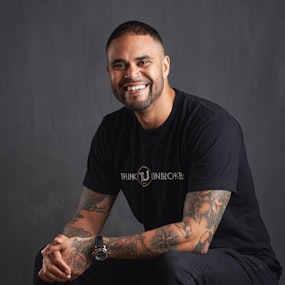
Michael Unbroken
Coach
Michael is an entrepreneur, best-selling author, speaker, coach, and advocate for adult survivors of childhood trauma.
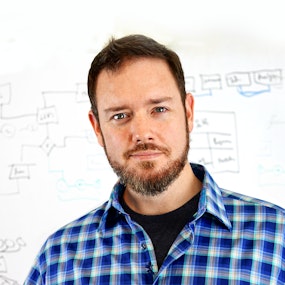
Seth Erickson
Chief Mischief Maker / Agency Partner / Best Selling Author
Seth Erickson’s personality, and particular brand of humor, is the kind that draws people to him. He’s a quick thinker with the ability to distill complex ideas into easy-to-understand information, and he’s not afraid to work hard and apply tenacity when needed. Sometimes Seth uses these traits for good, sometimes to go after world domination, but one thing is true above all else. Seth is a born storyteller. At the tender age of four, Seth was baffling his pre-school teacher with his vivid imagination. While many kids were naming shapes, Seth told stories with added plot points, built worlds, and introduced characters.
This verve for storytelling grew, as Seth did… which is to say, quite large. Seth is many things; a BBQ enthusiast, a taco aficionado who can and will make tacos out of anything, a Brazilian Jiu-Jitsu practitioner, and a scuba diver. He spent his early years as an illustrator, web designer, DJ, music producer, and recently became an author. However, perhaps most notable is the career Seth has built by merging aspects rarely found together: business, creativity, and wit.
Seth uses storytelling as a way of helping businesses, specifically Startup’s. Stats say 90% of start-up’s fail. Seth’s vision is to reduce that disheartening number by at least 10%. He recognizes many Startup’s excel at building their tech and ideas but fall short when communicating their value to the world. Enter Seth, who teaches these budding business owners one of the most effective communication methods. An art form that has been a part of humanity for as long as… w… Read More
Welcome to The Think Unbroken Podcast!
Here are some of my favorite recent guests!



























